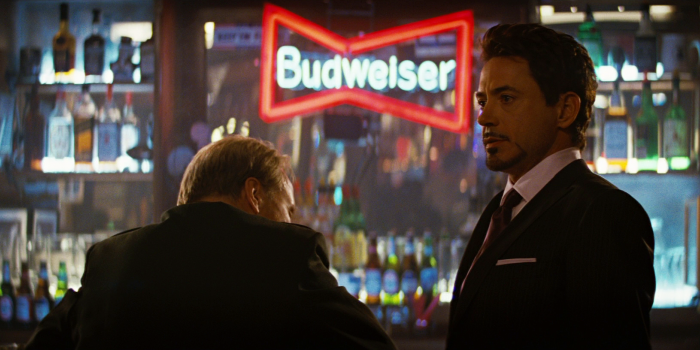
Cast: Melvil Poupaud, Suzanne Clément, Nathalie Baye
Director: Xavier Dolan
Country: Canada | France
Genre: Drama | Romance
Official Trailer: Here
Editor’s Note: Laurence Anyways is now open in limited release
“We have three hours,” warns a character at one point in Laurence Anyways. “It’s a lifetime,” comes the reply. It feels almost as though it might be in this, the third film from Canadian prodigy Xavier Dolan, an epic in every sense of the word as it traces ten years in the life of its titular protagonist across its monumental runtime. It was the great Roger Corman who famously joked that a movie should require papal dispensation to exceed ninety minutes. How fortunate that it was but a joke: here is a film that never would have gained the favour of an office as conservative as the pope’s, no matter how much it might earn the right to every last one of its seconds.
Looking is the essence of Laurence Anyways: the hows and the whys of our spectatorship; the presumptions of our perspective; the inherent judgement of our gaze.
 As much revered by aspiring young filmmakers for his considerable success as he is reviled by them for the frighteningly early age at which he has achieved it, Dolan’s Cannes debut with the remarkable I Killed My Mother in 2009, when he was just 20 years old, marked him the premiere wunderkind of world cinema. Not without its own considerable merits, Heartbeats—released just one year later—was the kind of semi-indulgent sophomore work typical of young artists told too often and too early of their own brilliance. The fascination with identity and otherness established in those films reaches astonishing new heights in this third effort, which sees Dolan move beyond the realms of prodigy and establish himself as a directorial talent of reckonable maturity.
As much revered by aspiring young filmmakers for his considerable success as he is reviled by them for the frighteningly early age at which he has achieved it, Dolan’s Cannes debut with the remarkable I Killed My Mother in 2009, when he was just 20 years old, marked him the premiere wunderkind of world cinema. Not without its own considerable merits, Heartbeats—released just one year later—was the kind of semi-indulgent sophomore work typical of young artists told too often and too early of their own brilliance. The fascination with identity and otherness established in those films reaches astonishing new heights in this third effort, which sees Dolan move beyond the realms of prodigy and establish himself as a directorial talent of reckonable maturity.
It’s the aspect ratio that gives it away. 4:3. We’re not used to looking at cinema this way. We’re not used to looking at people this way. Looking is the essence of Laurence Anyways: the hows and the whys of our spectatorship; the presumptions of our perspective; the inherent judgement of our gaze. Ever the consummate craftsman, Dolan begins the film with a masterfully shot sequence, his camera substituting for our eyes and subjecting us to the stares of people—male, female, young, old—on a bustling city street. They stop in their tracks as we pass, their voices dropping to a whisper if their jaws don’t drop to the floor, their eyes drawn to ours with a look of—what?—curiosity? Fear? Distrust? Distress? Malice? The eyes we share, we soon learn, are those of Laurence, a trans woman. In this first sequence, we look through them. By the end of the film, we have seen with them.
Empathy is the essence of Laurence Anyways, which plays on cinematic notions of POV and the male gaze in brilliantly nuanced ways not to shape our outlook, but to motivate us to shape it and to question it ourselves
 Scarcely are we permitted to feel so in touch with a character, flaws and all. Between Dolan’s immaculate direction and the extraordinary performance of Melvil Poupaud, we come to know Laurence so intimately in the course of this film we feel almost one with him. We feel every callous judgement of those passing eyes on the street. We feel each explosion of anger as colleagues, as friends, as family fail to understand how excruciating a thing it is to live in denial of oneself. We feel, especially, the dizzying sense of elation as he—arriving in class for the first time as she—is accepted by his students after a pause of almost unbearable length. Empathy is the essence of Laurence Anyways, which plays on cinematic notions of POV and the male gaze in brilliantly nuanced ways not to shape our outlook, but to motivate us to shape it and to question it ourselves. Whatever the viewer’s beliefs may be, Dolan demands they be answered for: why, he begs—almost furiously at times—would anyone want to deny this woman the happiness she deserves?
Scarcely are we permitted to feel so in touch with a character, flaws and all. Between Dolan’s immaculate direction and the extraordinary performance of Melvil Poupaud, we come to know Laurence so intimately in the course of this film we feel almost one with him. We feel every callous judgement of those passing eyes on the street. We feel each explosion of anger as colleagues, as friends, as family fail to understand how excruciating a thing it is to live in denial of oneself. We feel, especially, the dizzying sense of elation as he—arriving in class for the first time as she—is accepted by his students after a pause of almost unbearable length. Empathy is the essence of Laurence Anyways, which plays on cinematic notions of POV and the male gaze in brilliantly nuanced ways not to shape our outlook, but to motivate us to shape it and to question it ourselves. Whatever the viewer’s beliefs may be, Dolan demands they be answered for: why, he begs—almost furiously at times—would anyone want to deny this woman the happiness she deserves?
This is a film in which few items in the directorial toolbox go unused. Dolan is an unashamed stylist, flourishes of expressionism permeating the movie at every turn: slow-motion sequences; floods of symbolic water; painterly tableaux; choreographed scenes more typical of music videos than cinema. For all the aesthetic abstractions, however, the most powerful technique Dolan brings to bear is love, that most primitive human emotion. Laurence Anyways is his masterpiece, not because it is a great transsexual love story, but because it is simply a great love story, and the extent of its greatness proves that there is no difference between the two. Poupaud and Suzanne Clément, as Laurence’s on-and-off lover across the decade we spend together with them, enact an epic romance more powerful, more convincing, more real than most ever seen upon a screen. What a love. What a film.
[notification type=”star”]95/100 ~ AMAZING. Laurence Anyways is Dolan’s masterpiece, not because it is a great transsexual love story, but because it is simply a great love story, and the extent of its greatness proves that there is no difference between the two.[/notification]




Pingback: vape pen()
Pingback: https://www.facebook.com/flatratecomputerservice/()
Pingback: Manifestation Miracle Reviews()
Pingback: http://www.sasha-blog.ru/component/k2/itemlist/user/85220.html()
Pingback: banheiras()
Pingback: porno()
Pingback: Pablo Tartsah()
Pingback: click here to read()
Pingback: Leaflet template()
Pingback: movie2k()
Pingback: bikiniluxe coupon()
Pingback: league of legends clothes()
Pingback: video competitions()
Pingback: injury lawyer()
Pingback: Brand Bangla Eshop()
Pingback: kids toys frozen()
Pingback: local seo minneapolis()
Pingback: essay pussy()
Pingback: Kinder()
Pingback: elderly transportation services()
Pingback: Recommended Site()
Pingback: huge tit teen()
Pingback: Gascheck()
Pingback: finn frankies bikinis()
Pingback: pron hub.com()
Pingback: valentines day gifts for her()
Pingback: 50c()
Pingback: Logo design brisbane()
Pingback: blackjack()
Pingback: sacred 3 trainer()
Pingback: town hall 8 war base()
Pingback: town hall 8 war base for clan wars()
Pingback: Stem Cell()
Pingback: This Site()
Pingback: Tai Lopez podcasts()
Pingback: useful reference()
Pingback: stlpiky()
Pingback: boom beach unlimited diamonds()
Pingback: hack hungry shark()
Pingback: boom beach free diamonds()
Pingback: my singing monsters diamond cheat()
Pingback: Simple Drawing For Kids()
Pingback: eating healthy busy()
Pingback: british used clothing()
Pingback: antispam e.v.()
Pingback: health coach singapore()
Pingback: sales training course singapore()
Pingback: Scrapbook()
Pingback: Medical Marijuana Renewal San Francisco()
Pingback: Roselia()
Pingback: social media optimization service()
Pingback: dog walker()
Pingback: Jasa Tukang Taman()
Pingback: binary broker()
Pingback: take home pay calculator()
Pingback: how to get rid of bags under eyes()
Pingback: Inner Peace Quotes()
Pingback: cerrajeros valencia baratos()
Pingback: IT Services Ocala FL()
Pingback: Best laser hair removal nyc()
Pingback: leather organizer portfolio()
Pingback: car accessories for short people()
Pingback: nose hair trimmer best one()
Pingback: Godaddy Coupons()
Pingback: Clean Chocolate()
Pingback: NinjaTrader-Institutional Automated Trading()
Pingback: party powders()
Pingback: cerrajeros elche 24 horas()
Pingback: australias worst bank()
Pingback: http://zombiediary2hackandcheats.com/()
Pingback: grand menage a st-hubert()
Pingback: electrician wigan()
Pingback: Thai Porn()
Pingback: wall caddy organizer()
Pingback: Jewell Kosinski()
Pingback: in home dog sitter in naples()
Pingback: Homepage()
Pingback: moving helpers()
Pingback: solar related()
Pingback: handuk murah()
Pingback: Mentor()
Pingback: affärsjurist i stockholm()
Pingback: wood sunglasses()
Pingback: natural sleeping pills for women()
Pingback: Gemstone Jewelry()
Pingback: best expert advisor()
Pingback: Excel Consultants()
Pingback: stanovanje()
Pingback: screen protector()
Pingback: hollywood news()
Pingback: housework()
Pingback: homes san diego()
Pingback: keepyourhair.cba.pl()
Pingback: dog walking naples florida()
Pingback: crossfit()
Pingback: porno()
Pingback: best pet care in naples()
Pingback: lovetts lovin pet and home care()
Pingback: optimine.com()
Pingback: singorama.com()
Pingback: phen375()
Pingback: raspberry ketone()
Pingback: selbstverteidigung übungen()
Pingback: clash of royale()
Pingback: Day Spa Double()
Pingback: Scotts lawn()
Pingback: law of attraction and love()
Pingback: Sexafspraak()
Pingback: whatsapp channel seller()
Pingback: proxy list()
Pingback: free loops()
Pingback: Go Here()
Pingback: short jokes()
Pingback: web hosts india()
Pingback: just click the following webpage()
Pingback: ADO()
Pingback: Post Free Ads()
Pingback: Purely()
Pingback: clash royale hack no survey()
Pingback: The Lost Ways Review()
Pingback: porno()
Pingback: East Lyme CT DJ()
Pingback: Vacation Rentals()
Pingback: jet stupid()
Pingback: youtube.com()
Pingback: www.shinlone.com()
Pingback: http://pintupartisilipat.angelfire.com/()
Pingback: Darkwave()
Pingback: Steve Rahseparian()
Pingback: business strategist london()
Pingback: mensfitness()
Pingback: look at this website()
Pingback: cityprodentists.com()
Pingback: blog - klimczak hair designers()
Pingback: Medix College Reviews()
Pingback: Buy Isagenix 9 Day()
Pingback: android game cheat apk()
Pingback: Neodymium magnets for sale()
Pingback: Prop Hire Melbourne()
Pingback: Medix College Reviews()
Pingback: Kamagra()
Pingback: Kenyans()
Pingback: judi bola()
Pingback: Teflon beaker low form()
Pingback: Facebook hack()
Pingback: gengviral()
Pingback: riparazione iphone()
Pingback: photinia red robin()
Pingback: edarling()
Pingback: search engine optimization packages()
Pingback: http://www.christiantshirts.co/()
Pingback: seo()
Pingback: Potomac John Song()
Pingback: nuskin reviews()
Pingback: linkforsex.equityplays.date()
Pingback: http://kwel.me/b4c99b()
Pingback: fuck you google()
Pingback: instagram porn()
Pingback: puno bus()
Pingback: Buy Beats Instantly()
Pingback: SEO Trondheim()
Pingback: class schedule maker()
Pingback: trouver artisan avec avis pour devis travaux()
Pingback: boligadvokater()
Pingback: christian dance music()
Pingback: boligadvokater()
Pingback: Life Coaching()
Pingback: edarling()
Pingback: Casino()
Pingback: this website()
Pingback: massage()
Pingback: indonesia wallpaper()
Pingback: Prison()
Pingback: Pena()
Pingback: nordstrom coupon code()
Pingback: Register a company online()
Pingback: T fal deep fryer()
Pingback: best resume writing services reviews()
Pingback: san antonio bail bonds()
Pingback: Camiseta Giannis Antetokounmpo Milwaukee Bucks()
Pingback: pensum de contaduría publica()
Pingback: Data Recovery Services()
Pingback: Clicking Here()
Pingback: Graphic Tees()
Pingback: neo2 scam()
Pingback: Rafferty Pendery Scientologist()
Pingback: follar()
Pingback: Learn More()